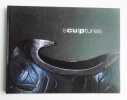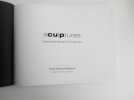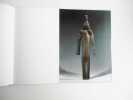31 books for « m casanovas »Edit
-
Century
19th (1)
20th (15)
21st (7)
-
Countries
Belgium (3)
Côte d'Ivoire (1)
France (27)
-
Syndicate
ILAB (15)
SLAM (15)
Topics
- Architecture (1)
- Balearic islands (1)
- Bibliography (1)
- Brittany (1)
- Contemporary look (1)
- Decoration (1)
- Ethnography (1)
- Ethnology (1)
- Exhibition catalogue (1)
- Football (1)
- Football (1)
- Genealogy (1)
- History (2)
- Literature (1)
- Magazine (1)
- Manuscripts (1)
- Miro (1)
- Newspapers press (1)
- Portugal (1)
- Reviews (1)
- Sciences (1)
- Simone (1)
- Spain (1)
- Translation (1)
[Fabrés, Riquer, Pasco, Casanovas, Fabré, Campa] - Collectif, Nait (Antoine de) (Traduction de l'espagnol par), Fabrés, Riquer, Pasco, Casanovas, Fabré, Campa (illustrations de)
Reference : 2260
(1899)
Majorque artistique, archéologique, monumentale
1899 1899 Jean Baptiste Pons et Cie, Barcelone (Espagne), Karl W. Hiersemann, Leipzig, 1899.1 volume in-folio en percale bronze, tête dorée, 174 pages + LXXXIX planches.Nouvelle édition de l'album de phototypies publiées en 1892, enrichi de nombreux détails architectoniques, avec texte historique et descriptifTrès légère trace de mouillure au 1er plat.
La librairie est ouverte du mardi au samedi de 9h30 à 12h30 et de 13h30 à 19h00. Commandes par courriel ou téléphone. Envoi rapide, emballage soigné. La librairie est ouverte du mardi au samedi de 9h30 à 12h30 et de 13h30 à 19h00. Commandes par courriel ou téléphone. Envoi rapide, emballage soigné.
ESQUISSE DE LA LITTERATURE ESPAGNOLE / 2e EDITION. [Paperback] CAMP JEAN / CASANOVAS D.
BROCHE. 1942. 102 PAGES. RELIURE FRAGILISEE. PHOTOS SUR DEMANDE
Merci de nous contacter à l'avance si vous souhaitez consulter une référence dans notre boutique à Authon-du-Perche.
UNE PENSEE ET UNE ATTITUDE, DISCOURS, NOTES ET DECLARATIONS, 1936-1939 (LA GUERRE ESPAGNOLE EN CATALOGNE)
Non précisé. Non daté. In-8. Broché. Etat d'usage, 1er plat abîmé, Dos satisfaisant, Intérieur acceptable. 93 pages.. . . . Classification Dewey : 946-Espagne, Portugal
La Guerre espagnole en Catalogne. Discours, Notes et Déclarations de Joan Casanovas, 1936-1939. Classification Dewey : 946-Espagne, Portugal
Qué es la republica - Coleccion Biblioteca de Divulgacion Politica.
Editorial La Gaya Ciencia. 1976. In-12. Broché. Bon état, Couv. convenable, Dos satisfaisant, Intérieur frais. 77 pages - nombreuses illustrations en noir et blanc dans et hors texte - livre en espagnol.. . . . Classification Dewey : 460-Langues espagnole et portugaise
Coleccion Biblioteca de Divulgacion Politica. Classification Dewey : 460-Langues espagnole et portugaise
De la inteligencia artificial a la inmortalidad del alma Papeles CJ N° 296 ; septiembre 2023
GLN-973, Cristianisme i Justicia, Barcelona 2023
Assez bon
Recetas imprescindibles, Cocina del BienEstar,
GLN-490, H Kliczkowski-Onlybook, Madrid, 2004
Assez bon
El Alma de Santa Teresa del Nino Jesus,
Parte de la portada pegada de nuevo ; HASP-290, Editorial Balmes 1946
Satisfaisant
Aprendizaje Industrial - 3° - Lengua Espanola
Editorial Everest broché Bristol illustré 222 pages en format -8
Etat D'usage
Esquisse De La Littérature Espagnole
Paris Editeur Henri Didier 1942 102 pages in-8. 1942. broché. 102 pages. - 2ème édition. In-8 broché 102 pages. Avec une carte en noir hors-texte. Couverture en bon état général avec des petites coupures aux mors. Brochage un peu sec sinon intérieur propre un peu jauni. Poids : 160 gr
Connaissance de la Chasse Juin - 2023 N°566- la gloire de nos cerfs- trophees records de france: une exposition inedite special game fair- superbes traques aux grands sangliers turcs- le retour du faisan grace au GPS?- le piegeage plebiscite par les ...
LARIVIERE. 2023. In-4. Broché. Bon état, Couv. convenable, Dos satisfaisant, Intérieur frais. 178 pages illustrées en couleur. . . . Classification Dewey : 70.49-Presse illustrée, magazines, revues
la gloire de nos cerfs- trophees records de france: une exposition inedite special game fair- superbes traques aux grands sangliers turcs- le retour du faisan grace au GPS?- le piegeage plebiscite par les citadins- test de la derniere nee des carabines sako: le modele 90 quest- cerf ou cervide? mettons nous sur la piste d'une famille surprenante- ... Classification Dewey : 70.49-Presse illustrée, magazines, revues
LES ANCETRES D'HENRI IV - 512 QUARTIERS.
CHRISTIAN BOURGOIS. 1991. In-8. Broché. Bon état, Couv. convenable, Dos satisfaisant, Intérieur frais. 211 pages .. . . . Classification Dewey : 944.03-Histoire de France de 1589 à 1789
Classification Dewey : 944.03-Histoire de France de 1589 à 1789
Gems. Monumental miniatures from America, Pacific, South East Asia and Africa.
Madrid: Arte y Ritual Gallery, 2009 in-8, 192 pages, 88 illustrations. Bibliographie. Cartonné, lég. marques d'usage, bon état.
Gems. Monumental miniatures from America, Pacific, South East Asia and Africa. (Madrid: Arte y Ritual Gallery, 2009). [M.C.: catalogue d'exposition, Art primitif]
Simone Schleifer Mireia Casanovas Soley Evergreen
Reference : 100063537
(2006)
ISBN : 9783822851456
Maisons minimalistes : Edition trilingue français-anglais-allemand
Taschen GmbH 2006 384 pages 25x25x3cm. 2006. Broché. 384 pages.
French édition - Livre présentant des marques de stockage et/ou de lecture sur la couverture et/ou les pourtours mais demeurant en très bon état d'ensemble.Expédition sous blister dans une enveloppe matelassée depuis la France
SCULPTURES .Ceremonial Vessels in Primitive Art.
2011 SCULPTURES .Ceremonial Vessels in Primitive Art.Arte y ritual Gallery ,2011 , in4° cartonné à l'italienne(34x26),123pp.57 objets présenté à travers de magnifiques photos.Abondantes illustrations.Très bon état.
Las inscripciones funerarias hebraicas medievales de Espana Tome I,
Turnhout, Brepols, 2001 Hardback, II+234 p., 30,5 x 44. ISBN 9782503512617.
Le corpus des inscriptions funeraires de la peninsule iberique s'est etoffe depuis les editions de M. Schwab (1907) et F. Cantera Burgos - J.M. Vallicrosa (1956). Cependant l'ensemble conserve est remarquablement restreint si l'on considere l'importance de la population juive dans la peninsule iberique durant les dix siecles du Moyen Age (jusqu'aux expulsions de 1492 et 1496) : il ne compte que 221 pierres. L'introduction rappelle la documentation sur les necropoles juives et etudie l'evolution morphologique des pierres. Le catalogue des inscriptions est particulierement detaille : la notice commence par replacer chaque pierre dans son contexte archeologique et historique. Vient ensuite une description materielle et paleographique la plus complete possible. Le texte hebreu est suivi de sa traduction, puis de l'analyse et de la discussion du texte ligne a ligne, et d'une bibliographie generale. La photographie de la pierre et de l'inscription (accompagnee d'une echelle) aura une qualite suffisante pour que l'ecriture sur pierre complete desormais la documentation de la paleographie hebraique medievale, en lui apportant des exemples bien situes dans le temps et le lieu. Languages : French.
Lempad IMPRESSIONS OF LEMPAD MONOGRAPH
, Picton Publishing, 2014 hardcover with dusjacket Format : 265 x 340 MM, number of pages 334, with nice photographs in color: English text fine condition !! ISBN 9789073187825.
The deeper you go in understanding his art works, the more the passion becomes febrile. What a complete artist he was, everything he touched ,architecture, sculpture, drawings, reliefs, had that magic or divine inspiration called Taksu among the Balinese which gave all his work a very special dimension. The geniality of the artist is reflected in his drawings in very particular features: the purity of line, the distribution of the space, the expression of the characters or the living plants and trees which seem to vibrate with real life. Everything spans with life and magic and the observer is immediately captured by the talent and spirit behind. Whatever he made, he caught the soul of the theme, weather an action, a creature , a cloud , the mud in the rice fields or even an inanimate object such as the ?sarongs?, the traditional Balinese garment which he makes them look almost palpable ,reflecting the animist principle that everything ?has a soul or ethos?.When one observes the family shrine sculpture portraying the different generations (Il. n ?.) with his self portrait in the right bottom corner , one perceives the love he put into it , the piece shines in front of our eyes !It is full of beauty and positive energy transmitting accurately the way he felt about his family. This work could stand next to the Mona Lisa and they would be smiling in harmony. Or the young soul mask he created while watching his grand daughter which is in itself the description of beauty and youth but also the representation of the fine half Yin of the Balinese microcosm .This mask can be considered one of the most touching works by the Master. Likewise the perfect rhythm found in the dancers in the ?Dance Lesson? where harmony, movement and teaching skill are fully achieved at the same time that technical perfection thus making out of it an outstanding masterpiece. He was obviously creating in a state of trance or meditation where he became the channel for the cosmic or spiritual energy. This ability, only found in great artists allowed him to take whatever material and transform it in to a great work of art .His free spirit guided him in the adventure of creating new models for the future Balinese generations. His intention full of generosity was to satisfy the gods as well as to teach his family, friends and colleagues.Lempad ,the person, was a simple man who always wore just a ?sarong ? and ate light as holly people do. His eyes, the mirror of the soul, would spark with intelligence and wisdom until the very last day of his long life. He had a strong character but was a balanced person with firmly rooted spiritual principles who would advise his grandchildren not to move when an earthquake was under way since he believed in fate and considered that when God wanted to take one s life, he just did. Likewise his father, he was born and brought up to be an Undagi , a figure who in the Balinese culture is some how ?sacred ?and assumed as such by all the community but which does not imply to have a privileged status since the spiritual world is constantly intermingled with the daily routines . There is no vanity or ego , of course no commercial intention since the act of creating is strictly related to the spiritual world following Animist ,Hinduist and Buddhist principles. And yet, Lempad was an unusual Undagi who always kept his own personal style ,more free and universal, very modern from the conceptual and the formal point of view which he applied in many of his works except for those commanded to him for certain specific temple needs. One only has to look at the family shrines in his first house in Bedulu and the second one in Ubud to discern that pure simple line associated with Majapahait style which he combines with a surprisingly modern and original touch shown on the way volumes are combined.(See Family Shrine in Bedulu)This is also clearly shown in the Temple Gate at Pura Merajan in Pengalasan which unfinished abstraction of the classical Bhoma head reminds us of the style of the catalan architect/sculptor Gaudi, who also combined abstract figures within the architecture as in La Pedrera building in Barcelona. Gaudi could somehow be considered the equivalent of an Undagi in the western world ;the last work commissioned to him by the Estate and one of hs most important works if not the most, was actually the Christian Temple of ?La Sagrada Familia?. The Wilmana figures that surround the Gods meeting Hall in the Temple of Pura Pengastulan is another good example of Lempad s originality.He plays with the double reading concept so they become masks when they are turned upside down , as Indonesian primitive sculptors used to do. The same rule applies to the Pan and Men Brayut sculptures that flank the entrance of the Palace Sareng Kandin Delodan which are depicted with very atypical austronesian facial features. Lempad left many of his works incomplete but unlike Balinese in general who tend to leave architectural creations unfinished since for them newness is equivalent to sacredness and sometimes it take ages until they have the means to do it , Lempad ?s tendency was wholly intentional since he seem to enjoy the aesthetical look of the unfinished.Equally important if not more, was the didactic function involved since it was a subtle way to teach the art of carving to future generations (See masks, Brayut sculpture, architectural elements pgs?. )and,overall, his principles would never allow him to continue his work when the inspiration was no longer present.If we believe our informants,another possible reason in the back of Lempad s mind was that the incomplete pieces could not be requested by the palace since ,?they remained to be finished ?.Lempad s first drawings were probably sketches for atchitectural elements in temples (see ilus S39A.) and did not start to draw on proper drawing paper until he was in his middle age. The first sketch books seems to have been given to him by the German Russian artist Walter Spies who was very impressed when seeing some of his sketches.At the beginning of his drawing period, the scenes were inspired on the Ramayana and Mahabarata Hindu ?Javanese fables , classic in a sense, which slowly evolved in a more free style drawings reflecting daily life , a feature seldom seen in Balinese art with exceptional cases such as the Yeh Pulu ancient reliefs in Bedulu which he saw during his childhood and would later on become a source of inspiration. The clean line flowing with firm and precise rhythm that applies in both drawings and sculptures is one of the main characteristics that distinguishes his work.This multi talented artist had an important role in the artistic scene that took place in Ubud in the 1930s and connected with the foreign circle of artists such as Walter Spies, Rudolf Bonnet or Miguel Covarubias who saw in Lempad a sort of universality and openness that was to create the Lempad legend. Everyone went to him for exchange of information and saw in him the medium or bridge from traditional to Modern Balinese Art. Most probably, Lempad, who was very humble person in essence never thought in the idea of having a book dedicated to him since in those days and in contrast to the western world, personal success was not an objective in Balinese culture but was left aside in benefit of the community .Nevetheless ,it has been a privilege for us who love and promote art in the world, to work on the first book ever dedicated to I Gusti Nyoman Lempad , a timeless master with balinese soul but universal mind whose work ,we consider, deserves to be known as part of the World Artistic Heritage .
CASANOVAS I MIRO (Jordi), QUILEZ I CORELLA (Francesc)
Reference : 568468
(2006)
ISBN : 848043161X
El viatge a Espanya d’Alexandre de Laborde (1806-1820). Dibuixos preparatoris.
Barcelona, MNAC, 2006. In-4 carré, broché, couv. ill. rempliée, 310 pp., texte en catalan (traduction en français in fine), ill. en noir et en couleurs. Bibliogr.
Catalogue de l’exposition présentée à Barcelone, du 30 mai au 27 août 2006, consacrée à l’Espagne vue par l’archéologue et diplomate Alexandre de Laborde et aux ouvrages que ce pays lui inspira. Très bon état. - Frais de port : -France 8,45 € -U.E. 13 € -Monde (z B : 23 €) (z C : 43 €)
Esquisse de la littérature espagnole
Henri Didier. 1938. In-8. Broché. Bon état, Couv. partiel. décollorée, Dos frotté, Intérieur bon état. 102 p.. . . . Classification Dewey : 860-Littératures espagnole et portugaise
Classification Dewey : 860-Littératures espagnole et portugaise
CASTILLO Juan José CASANOVAS José Maria
Reference : RO20021710
(1982)
ISBN : 8450050995
Copa del mundo de dutbol Espana 1982
CEDRAG SA. 1982. In-4. Relié. Etat d'usage, Couv. défraîchie, Dos frotté, Intérieur frais. 128 pages. De très nombreuses illustrations noires et couleurs dans le texte.. . . . Classification Dewey : 796.334-Football
Classification Dewey : 796.334-Football
ESQUISSE DE LA LITTERATURE ESPAGNOLE
HENRI DIDIER EDITEUR 2e édition. 1942. In-12. Broché. Bon état, Couv. convenable, Dos satisfaisant, Intérieur frais. 102 pages. Quelques annotations au crayon a papier. Ouvrage débroché.. . . . Classification Dewey : 860-Littératures espagnole et portugaise
Classification Dewey : 860-Littératures espagnole et portugaise
ESQUISSE DE LA LITTERATURE ESPAGNOLE.
HENRI DIDIER. 1942. In-12. Broché. Etat d'usage, Couv. légèrement pliée, Coiffe en pied abîmée, Intérieur frais. 102 pages.. . . . Classification Dewey : 860-Littératures espagnole et portugaise
Classification Dewey : 860-Littératures espagnole et portugaise
ESQUISSE DE LA LITTERATURE ESPAGNOLE / 2e EDITION.
"DIDIER HENRI. 1942. In-12. Broché. Etat d'usage, 2ème plat abîmé, Dos abîmé, Intérieur acceptable. 102 pages - Tache d'encre bleu ""turquoise"" sur le 2e plat (en pied) et sur les pages 94 a 102 inclus; alterant très légèrement la lecture - Coiffes en tete et pied abimées.. . . . Classification Dewey : 860-Littératures espagnole et portugaise"
Classification Dewey : 860-Littératures espagnole et portugaise
ESQUISSE DE LA LITTERATURE ESPAGNOLE - 2E EDITION.
HENRI DIDIER. 1942. In-8. Broché. Etat d'usage, Couv. convenable, Dos satisfaisant, Intérieur acceptable. 102 pages - coins frottés - mouillures sur les plats.. . . . Classification Dewey : 860-Littératures espagnole et portugaise
Classification Dewey : 860-Littératures espagnole et portugaise
ESQUISSE DE LA LITTERATURE ESPAGNOLE .
DIDIER HENRI. 1942. In-12. Broché. Bon état, Couv. convenable, Dos satisfaisant, Intérieur frais. 102 pages. des soulignements au crayon a papier sous le texte sans cosnéquence réelle sur la lecture. . . . Classification Dewey : 860-Littératures espagnole et portugaise
2eme EDITION. Classification Dewey : 860-Littératures espagnole et portugaise
 Write to the booksellers
Write to the booksellers











